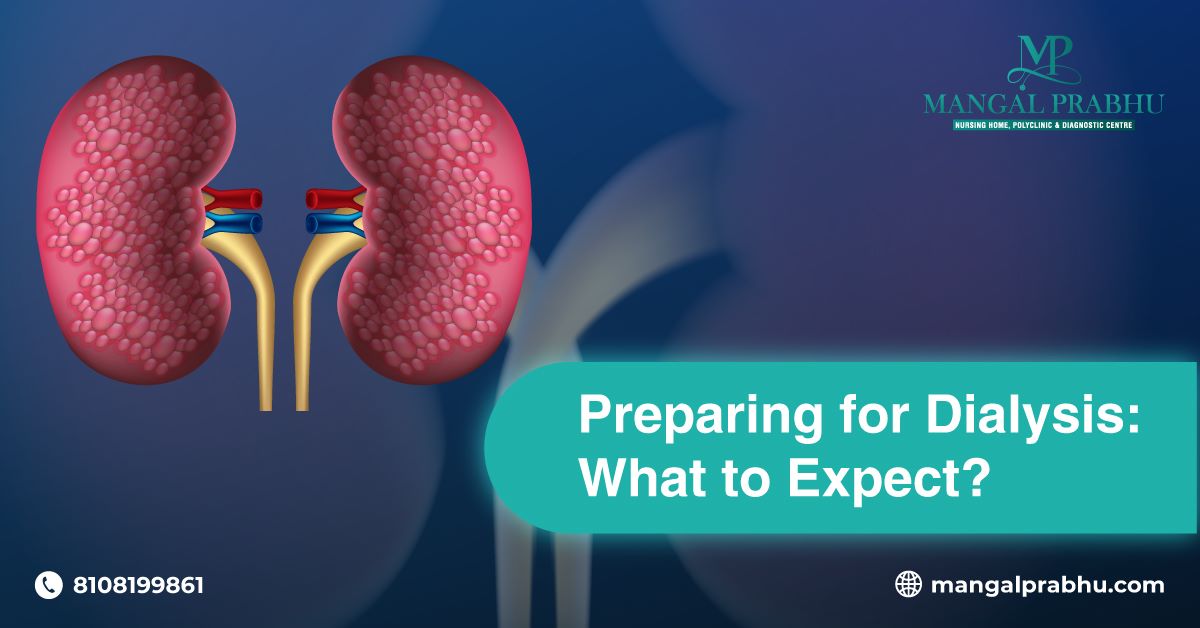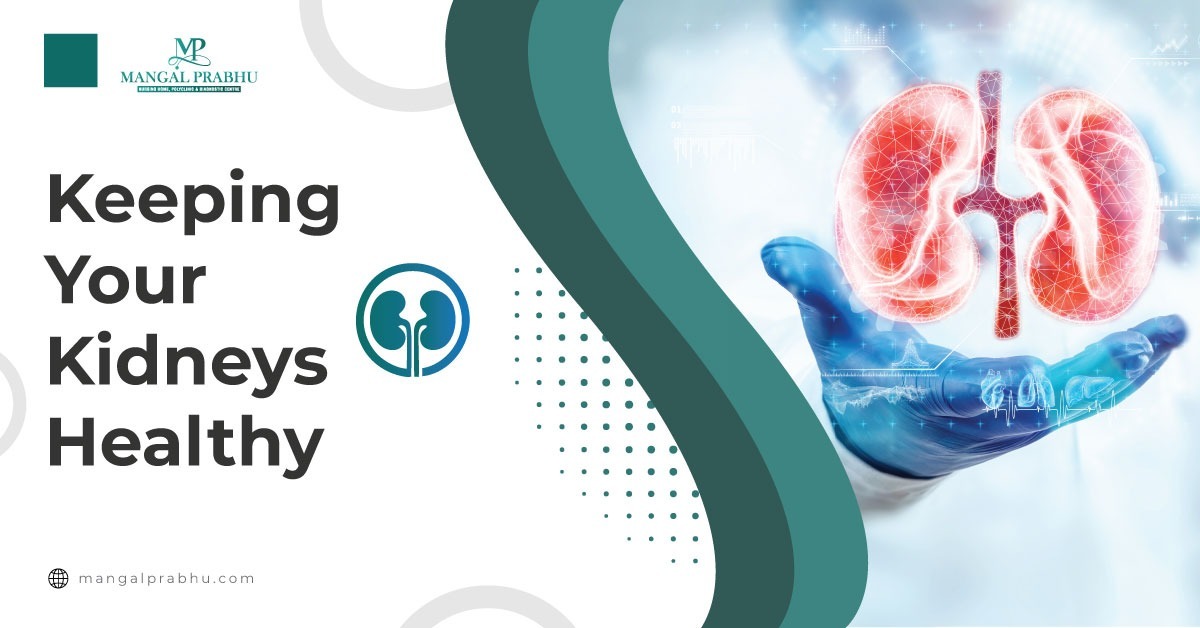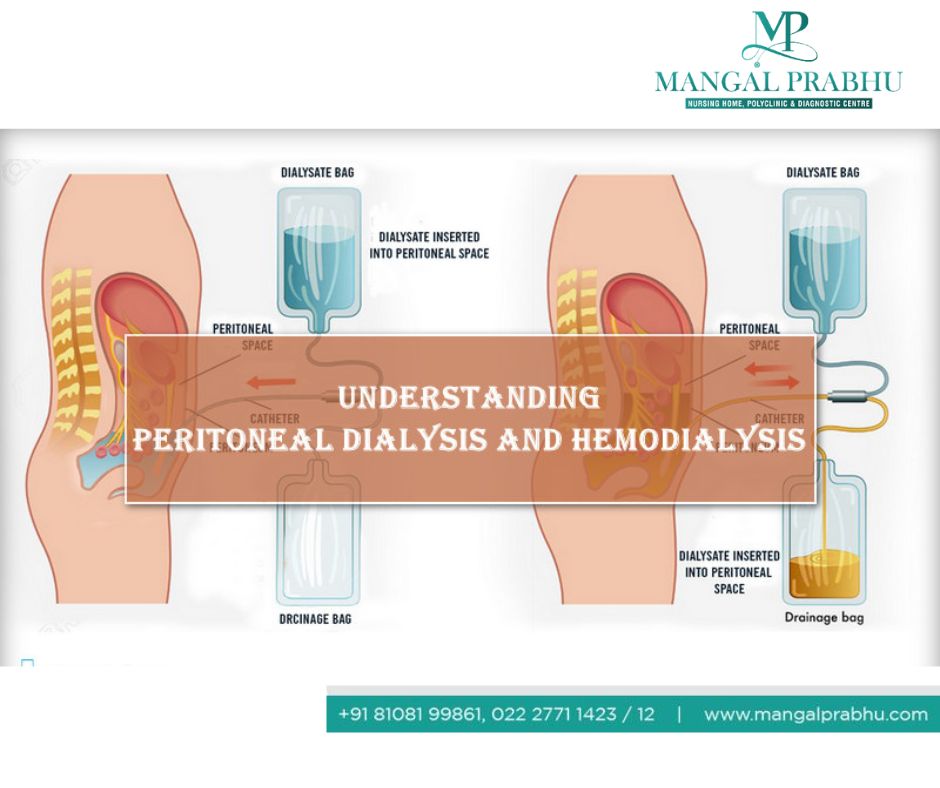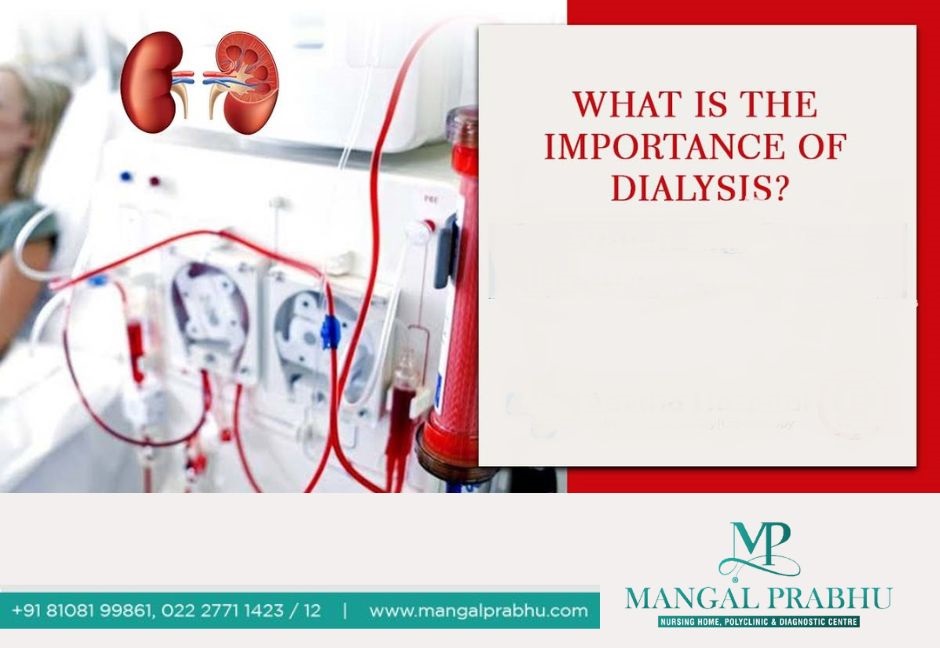
Preparing for Dialysis: What to Expect?
Your kidneys can fail due to many reasons. Chronic Kidney Failure, diabetes, lupus, and other issues can affect your kidney function, resulting in the buildup of toxins in your bloodstream. A nephrologist in Navi Mumbai recommends dialysis when your kidney function drops to a certain level, usually 15 percent. Let’s discover more about dialysis benefits, side effects, and preparation tips.
Types of Dialysis
Dialysis is performed in two ways:
- Hemodialysis: The blood is transferred for filtering through a dialyzer to an external machine. The purified blood is then returned to your body. It is a 3-4 hour session, performed thrice a week.
- Peritoneal Dialysis: In Peritoneal dialysis, a catheter is placed in your abdomen and is connected to the bag containing the dialysis solution. You can drain the liquid into another empty bag once it has collected the waste from your bloodstream. The procedure must be repeated 3-4 times a day.
How to Prepare for Dialysis
The preparation for dialysis is different for both types of procedures. For hemodialysis, the Arteriovenous fistula (AV) is created in your arm by joining an artery with the vein to create a broader blood vessel.
If you have too narrow blood vessels for this procedure, the surgeon might connect the two using a hollow tube, called a graft. By expanding the size of the blood vessels, AV ensures smoother blood flow in and out of your system. If it’s an emergency, the surgeon might insert a tube through your neck to get quick access to the blood vessels.
Also Read: What Is The Importance Of Dialysis? Which Patients Require It The Most?
For both procedures, there are certain restrictions regarding your food and fluid intake. Your healthcare provider will advise you to limit the fluid, as the dialysis procedure can’t remove the waste that’s accumulated in 3-4 days from your blood.
You also need to watch your diet. Excess intake of sodium, potassium, and phosphorus can increase the level of these minerals in your bloodstream quickly. It’s best to work with a dietician to have the best diet plan for your treatment.
Benefits of Dialysis
The biggest advantage of dialysis is that it removes waste and extra fluid within your body to prevent them from building up and damaging your organs. It also maintains the levels of sodium and potassium in your body. Moreover, dialysis regulates your blood pressure and prevents kidney diseases.
Possible Risks of Dialysis
Inserting a catheter in your abdomen carries significant risks. For example, bacteria and contaminants can enter your stomach through this catheter, resulting in vomiting, nausea, and fever. Likewise, hemodialysis carries the risk of infection around the site of the incision. Here are some side-effects of dialysis:
- Muscle cramps
- Low blood pressure
- Weakness from sudden blood fluctuation
- Blood loss
- Hernia
A kidney transplant is a good alternative for those who can’t schedule regular visits to the dialysis center in Navi Mumbai.
Conclusion
Every person’s body reacts differently to dialysis. Your risk of developing side effects also depends on your health condition and the type of dialysis you are considering. Discuss your risk factor with the healthcare provider to ensure smooth dialysis sessions.

Keeping Your Kidneys Healthy
Chronic kidney diseases affect 1 in every 3 people suffering from diabetes and 1 in 5 adults diagnosed with high blood pressure. In addition to that, a family history of kidney disease and a heart condition might also pose a threat to your kidneys. It’s important to schedule regular health checkups with a kidney specialist in Navi Mumbai to keep your kidneys in good condition.
Your kidneys consist of several nephrons that are responsible for filtering your blood. A gradual decline in your kidney function happens when these nephrons shut down one by one, making it difficult for your kidneys to function normally. As a result, you might need dialysis to filter your blood or a kidney transplant eventually.
How to Prevent Kidney Diseases?
Since kidney failures occur slowly and silently, they might not produce any initial symptoms. The condition can worsen over time until both kidneys stop functioning altogether. Here’s what can help prevent kidney diseases.
Be Careful with the Antibiotics and Other Medications
Antibiotics affect your kidneys negatively when you take an overdose. Likewise, NSAIDs can increase the risk of chronic kidney disease in patients. For those who are already on dialysis or are at high risk of kidney diseases, it’s important that you stop taking these medications or take them only after a doctor’s prescription.
Eat Healthy Foods
Whatever you eat is processed by your kidneys. This includes salt, sugar, processed and unprocessed food, foods rich in saturated and unsaturated fats, and so on. A poor diet can increase your risk of obesity, heart disease, and diabetes, all of which can be hard on your kidneys. You should focus on healthy vegetables, fruits, omega-3 fatty acids, and other foods rich in vitamins and minerals.
Watch Your Salt Intake
Too much salt in your diet puts you at high risk for high blood pressure, which is the leading cause of kidney diseases. Excess salt increases the volume of protein in your urine. This also increases your risk of kidney stones. You should watch your salt intake, whether or not you have existing kidney disease.
Keep Yourself Hydrated
People with kidney stones are advised to drink enough water to prevent dehydration. Water helps pass the waste products to your bladder, which is excreted from your body through urine. Not drinking enough water will hamper the filter’s function, leading to kidney stones and other infections. You should aim to drink at least 5-6 cups of water every day and more if you spend the day out in the heat.
Exercise Daily
Exercise keeps your heart in good shape, which in turn, prevents kidney damage due to an existing medical condition. That doesn’t mean you need intense workout sessions. Just take a walk for 15-20 minutes every day when starting. You can gradually increase your limit. But, before exercising, consult your doctor about whether it’s safe to practice physical exercises. How will it affect your kidneys?
People with kidney diseases might need to hit the dialysis center in Navi Mumbai to get their blood filtered every week or twice a week. You can discuss more treatment options with a urologist.

End-stage Renal Disease
End-stage renal disease, or kidney failure, occurs when your kidneys fail to function and can no longer filter the blood normally. As a result, you might need a kidney transplant or dialysis from a kidney specialist in Navi Mumbai. Your kidneys are responsible for excreting the waste and fluid from your blood through urine. When they stop functioning, these waste particles and excess fluid build up in your blood.
The fifth stage of kidney disease is life-threatening and can result in loss of life if not addressed immediately. In addition to filtering blood, your kidneys are responsible for striking a perfect balance between salt, minerals, and water in your body. They create urine so that excess waste can be excreted.
Causes of End-Stage Renal Disease
Kidney disease can occur due to a number of health conditions, a sedentary lifestyle, and a poor diet. It can damage your kidneys at once or cause slow damage, which eventually develops into chronic kidney disease.
Here are the common causes of end-stage renal disease:
- Birth defects
- A history of severe urinary tract infections that occurred repeatedly
- Heart disease or hypertension
- Polycystic kidney disease
- Lupus and other autoimmune diseases
- Kidney stones
- Diabetes
Sometimes, chronic kidney diseases, like cancer, can cause kidney failure. Whatever the cause is, it’s important to see a urologist in Navi Mumbai immediately if you notice any or all of the below symptoms.
Symptoms of End-Stage Renal Disease
Unfortunately, kidney diseases don’t produce any serious symptoms initially. As the condition progresses and your kidney fails, you might notice the below symptoms.
- Excess fatigue and weakness
- Nausea and vomiting
- Swollen ankles and feet
- Muscle cramps
- Itching
- Loss of appetite
- Unusual changes in urination
- High blood pressure
- Difficulty in concentration
- Chest pain and shortness of breath due to fluid buildup
Contact a urologist immediately if you notice these symptoms. These are often the signs that your kidney has stopped functioning, and you might need immediate treatment. However, these symptoms can also indicate other health problems, which aren’t as serious as end-stage renal disease. It’s best to consult a healthcare provider for a comprehensive diagnosis.
Treatment for End-Stage Renal Disease
A kidney transplant is a permanent solution to end-stage renal disease. In transplant surgery, the surgeon will replace the damaged kidney with the kidney of a living person or a deceased.
Everyone has two kidneys, and it’s totally possible to live with one. Before the transplant, the surgeon will conduct a few tests to ensure the donor’s kidney is a good match for you. After the transplant, you may have to take immune-suppressant medications to prevent your immune system from rejecting the new kidney, assuming it is a foreign object. Once the transplant is done successfully, your new kidney will start functioning like normal.
If you are considering dialysis, know that you will have to take dialysis treatment till the transplant surgery. Visit a dialysis center in Navi Mumbai to discuss the dialysis procedure, how frequently you need that, and which dialysis is best for your condition.

What Is the Difference Between Hemodialysis and Dialysis?
The kidneys are one of the major organs in the human body and perform multiple functions. They help remove waste products generated in the body through diet metabolism. The waste is excreted out of the body in the form of urine. The kidneys also remove excess salt, water, many drugs which we consume, regulate acid and potassium content in the body and help balance the body fluids. Kidneys also secrete hormones that trigger production of red blood cells in the body, regulate blood pressure. Kidneys also produce an active form of Vitamin D that is required for strong and healthy bones, a kidney specialist in Navi Mumbai.
Needless to say, kidneys are prone to various ailments and conditions including kidney failure. Kidney failure may be Reversible- meaning, it can be recovered with treatment. End-stage or chronic kidney failure is one in which kidneys are no longer able to cope and dialysis and transplant are the only options.
Dialysis is a treatment in which the blood of patients with kidney failure is cleaned through artificial means, either outside the body or inside the body. Combined with other medication, dialysis helps the patient of end-stage kidney failure live longer which is carried out at a dialysis center in Navi Mumbai.
Types Of Dialysis:
There are 2 types of dialysis: Hemo and Peritoneal.
In Hemodialysis, the blood is cleaned outside the body using a dialysis machine and then sent back into the body. This can be done either at a hospital or at home. In peritoneal dialysis, a special liquid is put in the abdomen. As blood passes through blood vessels in the abdominal cavity, this liquid absorbs waste from them across the peritoneal membrane (lining of our abdomen). This polluted liquid is then drained away.
Difference Between The Two Types:
Hemodialysis
- Where it is done: At home or a hospital.
- How often it is done: 3 to 5 times a week.
- Complexity of the procedure:
The dialysis machine (dialyzer) requires a vascular access which is basically a pair of artery and vein through which the blood in the body is pulled out of the body and in to the machine, cleaned using special filters and then cycled back to the body. Initially access is achieved by placing a temporary catheter in central veins, usually in the neck. Later a surgery is done to create a fistula in the forearm.
- Ability to work: During the entire duration of the dialysis, the patient is either sitting or lying on bed and cannot perform any other activities. Rest of the days, they are free to work.
- Side effects of the procedure: Fatigue, low blood pressure.
- Diet Restrictions: Salt and water intake are mainly restricted along with certain other food items which have high potassium and phosphorous.
Peritoneal Dialysis
- Where it is done: At home
- How often it is done: Daily, 4 to 6 times per day or in the night.
- Duration of the procedure: 3 to 5 hours per day in total
- Complexity of the procedure:
Using laparoscopic surgery, a peritoneal catheter is inserted into the lining of the abdominal wall (peritoneum), which provides an access to the abdominal cavity. The patient can use this access 2 weeks after it has been created.
On a daily basis, the patient must fill the abdominal cavity with a special fluid (dialysate filter), through this access point. The fluid cleans the blood through the internal walls of the abdomen and then drains into a collection bag which the patient or a caretaker must empty out.
- Ability to work: This procedure can be done at night, which means, the patient can perform his/her normal activities during the day. The person can even travel, as long as he/she is able to perform this procedure on his/her own, in a clean place.
- Side effects of the procedure: Risk of infection of the Catheter(or) abdomen and limitation of membrane function.
- Restrictions: There are fewer restrictions to diet with this procedure compared to hemodialysis.

WHEN SHOULD I SEE A UROLOGIST?
A urologist in Navi Mumbai is a doctor who specializes in diagnosing and treating diseases of the urinary system. This system keeps the body clean by filtering out wastes and toxins and taking them out of the body. The urinary tract includes:
- Bladder.
- Kidneys.
- Ureters.
- Urethra.
A urologist in Juinagar, Navi Mumbai also treats conditions involving the reproductive organs and the adrenal glands. The adrenal glands are located on top of the kidneys. The reproductive systems of males and females are linked closely to their urinary systems.
A urologist is a medical doctor specializing in conditions that affect the urinary tract in men, women and children, and diseases that affect the reproductive system. These conditions range from peeing too much or too little to being unable to father a child.
A patient may be referred to a urologist for treatment of a range of conditions:
- Urinary tract infections (UTIs)
- Incontinence
- Male infertility
- Kidney disease
- Renal transplantation
- Urologic oncology
- Bladder prolapses
- Cancers
- Enlarged prostate
- Erectile dysfunction
- Peyronie’s disease
- Interstitial cystitis or painful bladder syndrome
- Kidney and ureteral stones
- Prostatitis
- Undescended testes, or cryptorchidism
- Urethral stricture.
- Paediatric Urology
What Can I Expect from a Urologist?
- The urologist will normally perform a range of tests to determine what the problem is. Imaging tests, such as an ultrasound, CT, MRI scan, can help the urologist to locate the problem and a urine test may be performed to check for bacteria and other signs of disease.
- If the situation is more serious, a biopsy may be performed; this is traditionally to check for cancer and other disorders. The urologist may also ask you questions about your medical history and carry out a physical examination.
- If you’re experiencing a frequent need to urinate pain in passing urine, difficulty in passing urine, blood in urine, pain in your lower back, or trouble sustaining an erection and early ejaculation. You should consult an expert. In order to maintain a healthy urinary tract, urologists recommend that you regularly empty your bladder and drink water instead of caffeine.
- They also stress the importance of avoiding smoking and maintaining a low-salt diet. By following these simple rules, you can prevent a wide range of urological problems. All tumors or cancer of the kidney, prostate, penis, urinary bladder, and testis are also treated by the urologist.
Conclusion
To prevent the diseases mentioned above, doctors advise staying hydrated and holding pee for long durations as it can severely affect your health. Maintaining hygiene while excreting and proper sanitization is a general rule of thumb.

What is the importance of dialysis? Which patients require it the most?
Dialysis
Dialysis is an artificial way of carrying out the functions of kidneys. People who have failed or damaged kidneys may have difficulty eliminating waste and unwanted water from the blood. With the help of dialysis treatment in Navi Mumbai these process can be done artificially. It is also known as Renal Replacement Therapy(RRT).
The kidney’s function is to regulate the body’s level of water and minerals and remove waste. But dialysis has some limitations such as the kidney can also secrete certain products that are important in metabolism whereas dialysis is not able to do this.
Who needs Dialysis?
A person whose kidneys only works 10-15% of their capability is someone who is in need of dialysis. According to a survey around 14% of adults aged above 30 have chronic kidney disease (CKD).
Kidneys filter around 120 to 150 quarts of blood each day-if they are healthy. If the kidneys are not filtering the blood properly the waste builds up in the blood that might cause coma and even death. With the help of dialysis, we can prevent the waste products in blood from reaching hazardous levels.
Types of Dialysis
There are variety of dialysis. But most common dialysis are majorly three.
- Intermittent haemodialysis
- Peritoneal dialysis
- Continuous renal replacement therapies (CRRT)
Let’s discuss each of them briefly to understand them.
INTERMITTENT HEMODIALYSIS
In this dialysis the blood circulates outside the body. It goes through a machine with special filters. In this we use a flexible tube known as catheter which is inserted into the vein through which the blood comes out. Just like the kidneys the filters also cleanse the blood removing the waste product from the blood. The filtered blood then returns to the patient through another catheter. This works like an artificial kidney.
To insert catheters surgery is done to enlarge a blood vessel usually in the arm making it possible for the catheter to enter easily.
This filtration or haemodialysis is usually done three times a week, for 3 to 4 hours a day, depending on the wellness of kidney.
Haemodialysis can be done at a special dialysis center or at home.
But if you are willing to have haemodialysis at home you must have caretaker who knows exactly what to do in dialysis and home must also be suitable for taking haemodialysis equipment.
- PERITONEAL DIALYSIS
Peritoneal dialysis is based on the principle of diffusion.
In this dialysis process a sterile dialysate solution rich in minerals and glucose us run through a tube into the peritoneal cavity, the abdominal body cavity that surrounds the intestine. It has a semi-permeable membrane, the peritoneal membrane.
Peritoneal dialysis is less efficient than haemodialysis. It takes longer periods, and it removes around the same amount of total waste product as haemodialysis.
As it can be done at home it is more convenient and comfortable giving patient more freedom and independence. It can also be done while travelling as it requires minimum of specialized equipment.
There are two main types of peritoneal dialysis
- Continuous ambulatory peritoneal dialysis (CAPD)
It requires no machinery and even the patient can do it. This happens every day, four or five times per day
- Continuous cyclic peritoneal dialysis (CCPD)
It uses a machine to exchange fluids. It is generally done every night, while the patient sleeps. It usually takes around 10-12 hours.
This is more convenient to elderly people, infants and children.
- CONTINUOUS RENAL REPLACEMENT DIALYSIS
This dialysis can be intermittent or continuous.
While a session of intermittent dialysis lasts for up to 6 hours, continuous renal replacement are designed for 24 hour use in an intensive care unit(ICU).
It can involve either interaction or diffusion. It is better tolerated than intermittent dialysis, because the process is slower. This leads to fewer complications.
With all these types of dialysis there are a few risks that comes along. A few of them are
- Hypotension
- Cramps
- Nausea
- Headache
- Back pain
- Chest pain
- Fever
- Chills
Symptoms of kidney failure
We humans can work on a single kidney even after we all have two kidneys. Symptoms may vary from people to people. Some of them may include:
- Fatigue
- Increasingly frequent need to urinate
- Erectile dysfunction
- Nausea
- Blood in urine
- Blood in semen
- Protein in blood
Doctor After diagnosing kidney failure we go for dialysis. But it also comes with a few side effects which are
- Muscle cramps
- Low blood pressure
- Sleep problems
- Depression
- Fluid overload
Kidney is an important part of human body, so any disease relating to kidney is very serious condition and should be taken very seriously. Once the kidneys fail, they are unlikely to recover but with the help of dialysis we can enhance our wellbeing and prolong life for up to 20 years or more.
- STAY HEALTHY, STAY SAFE!
